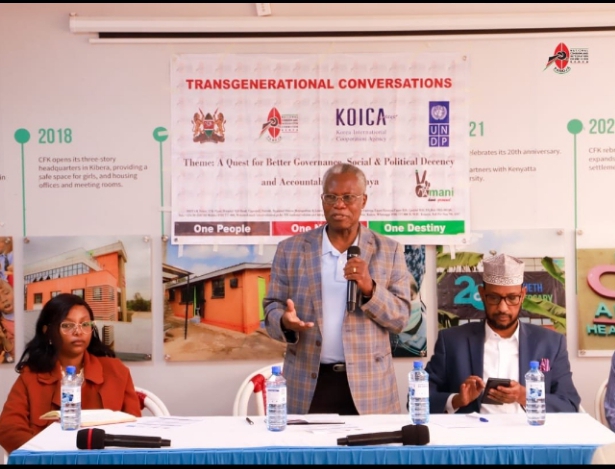Youth Voices Take Center Stage in NCIC Dialogue on Governance

NCIC Chair Rev. Dr. Samuel Kobia (center) with Commissioners Hon. Abdulaziz Ali (right) and Wambui Nyutu (left) during the transgenerational conversation held in Kibra on Wednesday, September 10, 2025.
By Winnie Atieno
The National Cohesion and Integration Commission (NCIC) on Wednesday, September 10, convened a transgenerational conversation at Kibra in Nairobi, bringing together youth, elders, and leaders to reflect on governance, inclusivity, and political decency in Kenya.
The young people expressed frustration that their voices are often ignored, urging that the issues they raise should be addressed by those in leadership.
Speaking during the transgenerational conversation, NCIC Chair Rev. Dr. Samuel Kobia assured participants that they were free to express themselves without fear of intimidation or reprisals.
“I just want to assure the youth and everybody who is participating that you should feel free to say whatever you want to say and you will not be followed by anybody,” he said. However, he cautioned that freedom of expression must remain within the law.
“As long as what you have said does not fall into the category of hate speech, violence or discriminatory” he added.
On corruption, NCIC Commissioner Hon. Abdulaziz Ali challenged citizens to abandon the mindset that corruption is normal, stressing that change begins with individuals.
“We have normalized corruption, everybody thinks that corruption is fine with us, but what if me and you stop it?” he asked.
Speakers further urged government to create inclusive spaces for youth participation, ensure recruitment opportunities are fair, and engage more with communities at the grassroots to better understand their concerns.
The commission also proposed a national conference bringing together government officials and institutions to root out corruption and reinforce integrity in recruitment processes.
In conclusion, NCIC commissioner encouraged Kenyans to shift focus from political leadership alone and instead embrace dialogue as a means to foster unity and good governance.





